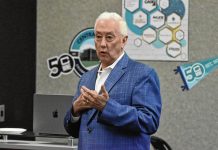City parks officials will pay nearly $9,000, and perhaps more, for environmental testing on a Jackson Street property the parks department hopes to purchase for storage.
The parks board on Thursday unanimously approved having Ark Engineering Services, Indianapolis, who did the Phase 1 environmental evaluation of the former site of Machinery Moving Inc. at 1360 Jackson St., continue with a Phase 2 evaluation including soil and water testing on the property and checking for asbestos.
Parks officials have been considering purchasing the property for several months. Permission to pay $300,000 for the property won approval from the park board in October and the Columbus City Council on Nov. 6, but with contingencies.
A second offer has been made on the property by another potential buyer higher than the city’s $300,000 bid, city officials said.
The property, owned by Norma Lienhoop, the aunt of Columbus Mayor Jim Lienhoop, has two structures that combined are about 9,000-square feet, including an office building constructed around 1971 and a shop facility built around 1973.
Ark’s Phase 1 evaluation triggered the need for more environmental investigation as state environmental reports indicate the site had at least three underground storage tanks at some point, according to the engineers. The first phase of the testing cost the city $1,800, according to the city clerk’s office.
That included one 2,000-gallon tank for gasoline, one 1,000-gallon diesel fuel tank and another 550-gallon diesel fuel tank, according to the Phase 1 report. The tanks were installed between 1972 and 1976 and were operated until November 1989, when the tanks were decommission and then removed, according to state records.
Mark Jones, parks director, said the engineers could find no documentation confirming the removal of the tanks, which resulted in the need for a Phase 2 environmental report on the property.
Jones has said if the property contains any contamination that is beyond the scope of the city to remediate, “we don’t want the site.”
For more on the story, see Saturday’s Republic.




